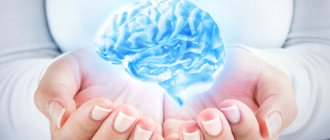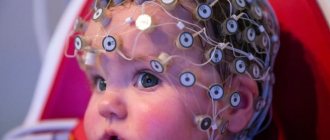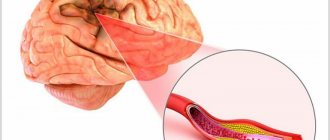Residual cerebral organic failure RCN or RCN
Residual cerebral organic insufficiency (RCON or RCI) is understood by neurologists, as well as parents of children with this diagnosis, as some kind of problem with the central nervous system.
This condition occurs as a result of persistent brain damage. In recent years, RCON has become increasingly widespread among children And the official Medicine has not yet found a logical explanation for this phenomenon
In general, today this disease is observed in 8.5% of children with neuropathy. Moreover, it is equally common in both boys and girls. RCON complements the clinical picture of neuroses
Diagnosis of deviation and modern treatment
Diagnostic examinations of a child with suspected cerebral insufficiency should be aimed at determining the nature and etiology of the abnormality.
In this case, the following clinical research methods are used:
- Electroencephalography of the brain . This is a sensitive method for studying the functioning of the brain based on the study of electrical impulses that emanate from individual areas of the brain. The procedure is characterized by an almost complete absence of contraindications.
- Echoencephalography . The brain is examined using sound waves that are reflected from the surfaces of the meninges, skull bones, and soft coverings of the head. Thanks to this procedure, it is possible to identify pathological changes or processes in the structure of the brain.
- Rheoencephalography of cerebral vessels . The procedure allows you to assess the state of blood circulation and the quality of blood flow through the main vessels.
Of course, in addition to the listed diagnostic methods, the child needs to be examined by an experienced neurologist.
Once the diagnosis is determined, the specialist will prescribe adequate treatment. Its complex includes the following events:
- Drug therapy . In this case, it is indicated to take amino acids (in particular, glycine, lecithin, folic and glutamic acids), hepatoprotectors, antispasmodics, as well as indirect antihypoxants - substances that help saturate the body with oxygen and reduce the need for it. In addition, in case of RCN, nootropic drugs are taken, which have a neurotrophic and neuroprotective effect directly on the central nervous system. Thanks to this, tissue metabolic processes are normalized.
- Vitamin therapy . Particular emphasis is placed on vitamins B6 and B11.
- Transcranial micropolarization . This procedure has a therapeutic effect on the nerve cells of the brain. This happens due to the use of direct current of minimal strength. The benefit of the procedure is that the development of nervous tissue is stimulated and new connections between cells are created. When performing transcranial micropolarization, a special cap with wires is put on the child’s head. The procedure does not cause any discomfort;
- Therapeutic massage , the technique of which is suitable for correcting disorders of the central nervous system. It helps improve blood circulation, strengthens muscles, helps restore nerve tissue and generally improves the child’s vitality.
- Gentle manual therapy techniques . They improve the passage of nerve impulses, stimulate blood circulation, stabilize the patient’s emotional state and help eliminate the effects of stress. The required therapy program is determined by a specialist.
- Also, for medicinal purposes, the child may be recommended swimming .
Causes of residual cerebral organic failure
In essence, residual RCN is a pathology that represents residual effects from damage to the nervous system in
perinatal labor or infancy
Researchers note that the risk of giving birth to a child with residual cerebral organic insufficiency increases in older women in labor. There may be several reasons for the development of this pathology
And, as a rule, this disease is formed under the influence of a whole complex of these factors.
Placental abruption during pregnancy and, as a consequence, intrauterine damage to the fetal brain Severe viral and infectious diseases suffered by a woman during the perinatal period Unstable emotional state of the expectant mother - stress, depression, hysterics, fears, etc. Unwanted pregnancy Unsuccessful attempt by the expectant mother to have an abortion Unhealthy lifestyle that the woman led while expecting a child - smoking, use of alcohol and drugs Exposure to radiation and unfavorable environmental conditions Various chemical damage to the body of a woman and child, including potent drugs Abuse of untested biological drugs active food additives Poor nutrition of a pregnant woman Sedentary lifestyle and lack of adequate physical activity Limiting the intake of fresh, clean air into the body of the mother and child The birth of a child before the due date - prematurity Immunological incompatibility of mother and child, Rh conflict General anesthesia received by a woman and baby during pregnancy during a cesarean section Various birth injuries resulting from drug-induced, prematurely induced or ill-conducted childbirth Mechanical head injuries received by a child in early childhood All kinds of infectious diseases in early childhood
Causes of chronic cerebrovascular insufficiency:
Basic:
- atherosclerosis;
- arterial hypertension.
Additional:
- heart disease with signs of chronic circulatory failure;
- heart rhythm disturbances;
- vascular abnormalities, hereditary angiopathy;
- venous pathology;
- vascular compression;
- arterial hypotension;
- cerebral amyloidosis;
- diabetes;
- vasculitis;
- blood diseases.
For adequate brain function, a high level of blood supply is required. The brain, whose mass is 2.0-2.5% of body weight, consumes 20% of the blood circulating in the body. The value of cerebral blood flow in the hemispheres is 50 ml per 100 grams per minute, glucose consumption is 30 µmol per 100 grams per minute, and in gray matter these values are 3-4 times higher than in white matter. Under resting conditions, the brain's oxygen consumption is 4 ml per 100 grams per minute, which corresponds to 20% of the total oxygen entering the body. With age and in the presence of pathological changes, the amount of cerebral blood flow decreases, which plays a decisive role in the development and increase of chronic cerebral circulatory failure.
The presence of headaches, dizziness, memory loss, sleep disturbances, the appearance of noise in the head, ringing in the ears, blurred vision, general weakness, increased fatigue, decreased performance and emotional lability - these symptoms most often simply “inform” a person about fatigue. Only when the vascular genesis of the “asthenic syndrome” is confirmed and focal neurological symptoms are identified, a diagnosis of “dyscirculatory encephalopathy” is made.
The basis of the clinical picture of discirculatory encephalopathy is currently recognized as cognitive impairment . In case of chronic cerebrovascular accident, it should be noted that there is an inverse relationship between the presence of complaints, especially those reflecting the ability to cognitive activity (memory, attention), and the severity of chronic failure: the more cognitive functions suffer, the fewer complaints. In parallel, emotional disorders develop (emotional lability, inertia, lack of emotional response, loss of interests), various “motor disorders” (disorders of walking and balance).
Residual cerebral organic failure: symptoms
Increased intracranial pressure - as a rule, to confirm this diagnosis, there is little analysis of clinical symptoms and additional diagnostics are required - echoencephalogram, electroencephalogram, as well as examination of the child’s fundus
Asthenic syndrome is characterized by fatigue, lethargy, drowsiness, general weakness, and headaches
Nervous tics or strange repetitive movements - frequent blinking, twitching of shoulders or lips, sniffling, constant straightening
Cold, damp extremities – arms and legs, sometimes “marbled” skin on them
Weather dependence is a strong reaction of the child’s body to the weather, expressed in fainting states, increased heart rate, decreased or increased blood pressure
Problems with the vestibular system - motion sickness in transport, on swings and attractions, feeling of nausea and lightheadedness, leading to vomiting
Unstable emotional background - irritability, frequent mood swings, moodiness and tearfulness
Intolerance to loud sounds and bright lights
Motor disorders, as a rule, are expressed by two opposite states - either inhibition and lethargy (such children are slow, “sway for a long time”, have difficulty getting involved in work, have difficulty switching attention from one object to another), or hyperactivity and impulsivity (hyperactivity is the inability to concentrate and maintain attention, instantaneous switching of attention to other objects, general inattention and absent-mindedness)
In the first case, children are very passive, lack initiative, inert, they sleep off after lessons and activities, physical activity
In the second - on the contrary, they are restless, fussy, active, excited, active. It is difficult to motivate them to read or to quiet activities, to put them to sleep
Video
Hyperactive child
A large number of children who receive a diagnosis of residual cerebral organic failure also have external deviations from the norm
deformation of the skull (dysplasia), teeth or ears, widely spaced eyes (hypertelorism), a strongly protruded upper jaw (prognathism), etc.
Residual cerebral organic insufficiency in children: what to pay special attention to?
For moms and dads, this wording can serve as a signal for them to pay special attention to the development of their baby
when he began to hold his head up, when he learned to roll over, when he smiled and began to walk, etc.
A child with such a diagnosis should receive
regular massage, gymnastics, as well as the maximum possible healing and hardening of the body
That is, parents of a boy or girl with residual cerebral organic insufficiency should pay special attention to the physical development of the child from the first days of his life
If you diagnose the problem in time and promptly take appropriate measures, you can get rid of it. Advanced cases of residual cerebral organic insufficiency can lead to serious consequences
Their consequences may be
Delayed speech development Various articulatory deviations Incorrect speech rate - fast or slow Poor school performance due to difficulties in developing basic writing, reading and counting skills Communication problems
If a child with residual cerebral organic insufficiency is not treated, then these symptoms will appear throughout the entire period of brain formation, that is, up to 25 years in men and up to 21 years in women.
In the future, this disease can provoke more serious problems - for example, a rapidly developing dependence on alcohol and other toxic substances
Participation of parents in the treatment of the child
A child with RCN must constantly feel support from his parents, otherwise the correction process will be incomplete.
Parents must organize a clear daily routine for the child and monitor its compliance. Strict adherence to the rules will lead the nervous, endocrine and immune systems to a state of stability. The transition to such a regime should be gradual, not abrupt.
Parents should also strive to ensure that the child expands his social circle. For this purpose, he can be enrolled in a sports section or some club. This way you can achieve two goals at once: integrate the child into the team and give him the opportunity to develop his talents. When choosing an activity, it is necessary to take into account the wishes and interests of the child.
Cerebral insufficiency, although it occurs due to disorders of the nervous system, is not a death sentence for the child. He will be quite capable of studying, communicating, making a career and starting a family in the future. The only condition for this is timely treatment and the deep involvement of parents in this process.
Residual cerebral organic failure treatment
Naturally, the elimination of this pathology should be carried out comprehensively. Official medicine advises prescribing drug treatment for a child with such a diagnosis. In addition, teachers should work with the little patient. However, the main role in getting rid of the disease should be played by the parents of a special child
We offer you to use a proven, effective and natural method of treating various neurological disorders, including residual cerebral organic insufficiency
See also:
Treatment of autism in children. Autism. Recovery method
Find out more about free recovery programs for RCN or RCN, autism, cerebral palsy and epilepsy based on the principles of biomed and naturopathy with a diet that includes natural products Tentorium
Seminar plan HERETentorium beekeeping products restore every cell of the body naturally according to the principles of biomedical correction of the body
They saturate the body with necessary enzymes, vitamins and microelements
Disclaimer The information provided in this article is for the reader's information only. It is not intended to be a substitute for advice from a medical professional











